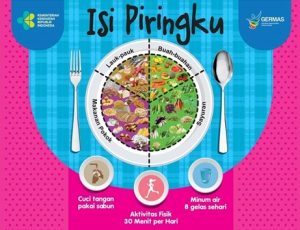 ilustrasi berpuasa. (foto: freepik.jpg)
ilustrasi berpuasa. (foto: freepik.jpg)
Fasting is one of the most important points in Rukun Islam. Every year, muslim society always makes it an obligation to have fast for the whole month in Ramadan. During Ramadan, muslim people should keep their body to stay healthy and fit in order to optimize mandatory prayers during Ramadan. Maintaining a healthy eating pattern during iftar and suhoor is a key point to keep our body fit during ramadan.
Fulfillment of daily nutrient requirements is mandatory to be achieved during fasting. The fulfillment of nutrient intake can be maintained through healthy eating patterns in suhoor and iftar. The fulfillment for iftar are 30% for main menu, 10% for snacks, 15% for side dishes, and for suhoor, 30% is allocated for main dish and 15% for side dish right before imsak.
Referred to Unair News at web.unair.ac.id in titled “Healthy tips during Ramadan” written by Lailatul Muniroh, S.KM., M.Kes as a nutritionist and lecturer in the nutrition study program faculty of public health, Universitas Airlangga, there are several tips that can be done to keep our body feet healthy during fasting.
-
- First, always pay attention to food intake during suhoor. During suhoor, choose food that is high in fiber such as fruit, vegetable, and food high in complex carbohydrates such as red rice, potato, yam, etc. By consuming enough food high in fiber, maximum rate of absorption can easily be achieved. Disease related to gastrointestinal systems such as constipation also can be prevented through enough fiber consumption during suhoor. Fiber also able to prevent blood sugar spike in the body,

- First, always pay attention to food intake during suhoor. During suhoor, choose food that is high in fiber such as fruit, vegetable, and food high in complex carbohydrates such as red rice, potato, yam, etc. By consuming enough food high in fiber, maximum rate of absorption can easily be achieved. Disease related to gastrointestinal systems such as constipation also can be prevented through enough fiber consumption during suhoor. Fiber also able to prevent blood sugar spike in the body,
ilustrasi isi piringku. (foto: kanjabung.com)
- Second point, managing an iftar diet correctly. Iftar can be executed gradually starting with mineral water, snacks, or fruit continued by the main meal. During iftar, it is not recommended to consume too much food. In order to manage food intake, it is very important to watch the nutrient content of the food and make sure it is well adjusted to our body’s needs and balance nutrition guideline “my plate”. According to my plate guideline, the content of each portion of an ideal meal consists of 50% fruits and vegetables, and the rest 50% is carbohydrate and protein.
- When consuming fruit, it is better to pay attention to the variety of the fruit. One of the most recommended fruits to consume during iftar is dates. Original dates contain 70% natural sugar that is easily absorbed by the body, rapid energy provision, and useful to normalize blood sugar concentration that is lower during the fasting period. During iftar, it is better to avoid fruit that contains gas such as jackfruit and durian. These fruits can cause flatulence and fullness in the stomach and reduce appetite. Consuming fruit containing too much water is recommended for iftar such as watermelon, melon, and rockmelon,
- Lastly, it is very important to keep our body moving and stay physically active. In order to achieve a healthy and fit body during Ramadan, do moderate exercise as much as 30 minutes for each day, have enough sleep by avoiding late night sleep or staying up late.
Author : Arvina Tria Nitami
